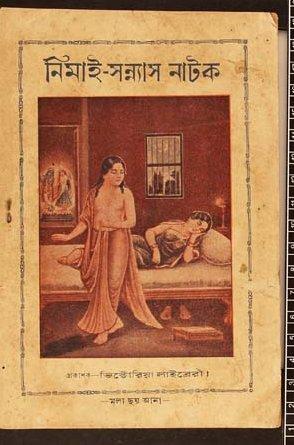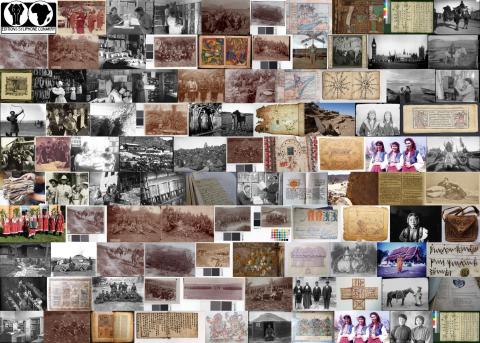
Aims and objectives
This project will digitise the wide collection of rare and unique material of, and on, Bengali drama held by a private collector, Dr Devajit Bandyopadhyay. The collection covers the 19th and early 20th centuries, and includes texts of formal 'modern' drama, texts of jatra or traditional Bengali folk theatre, books of songs from plays, and secondary material of that period.
The collection is carefully stored in Dr Bandyopadhyay's private flat, but much of the material is cheaply printed and produced, and so preserves badly, especially in Kolkata's hot humid climate. In addition much of it was in a poor condition when it reached him. At present, all the material can be copied, though often slowly and cautiously owing to its brittle state. Some items are already badly discoloured.
Dr Bandyopadhyay's huge collection, built up over a lifetime, covers a uniquely wide range of rare material, relating to three main areas of Bengali drama:
1. 'Formal' Bengali drama on Western models for the urban theatre: volumes of single play-texts, collections of play-texts, and studies. This wide variety of volumes also has a wide range of publishers, formal and informal. Many items were produced for private distribution only. Many others are made unique by virtue of the signatures, marginalia, or other manuscript insertions they contain. The collection is thus important not only for the history of drama but also for Bengali bibliography, book history and printing history. Finally, it is important for Bengali social history of the 19th century, the crucial development of new westernised cultural norms. The rise of a new patriotism, leading on to the freedom movement, can also be traced in many of the texts.
2. 'Jatra' or traditional Bengali folk theatre: this is a uniquely large collection of such texts, covering all major types, mythological, historical and socio-political. They are not linked to the world of formal or elite publishing, but to a different category of popular publishers. Basically, they are much closer to the tradition of oral transmission, so that any printed documentation is of special value.
3. There is also a large body of dramatic song-books, with and without notation. Drama provided a chief platform for song-writing and the development of new musical conventions. This collection contains some extremely rare volumes of theatrical and other songs, including unique manuscript volumes of material not known from other sources.
Apart from the documentary value, the collection offers unique opportunities for historical and thematic study. Bengal saw the first major rise of Western-type drama in India. The Western influence derived largely from Shakespeare and other Renaissance drama, and had suggestive resemblances with traditional folk theatre. The entire process can be traced through this archive, combining jatra with Western-type drama.
Both the lines of development, jatra and Western-type drama, are living influences on contemporary Bengali theatre. In fact, its main formal identity is defined through various balances and combinations of these two influences. Few practising theatrepeople have the opportunity to access this type of rare material. If it is now made accessible, some results could be expected in the future development of Bengali drama. This could be a rare instance of an archive influencing a current art form in a major way.
The material will be digitally copied and the original material will remain with its present owner, Dr Devajit Bandyopadhyay. The copies will be held by the British Library and the School of Cultural Texts and Records. Jadavpur University.
Outcomes
249 titles have been digitised and listed, some of them multi-volume, making a total of 385 volumes and a total of 112,174 images. The breakdown is as follows:
- Journals: 7 titles, 78 volumes
- Collected works: 16 titles, 51 volumes
- Single formal or Western-style plays: 150 titles, 153 volumes
- Jatra or indigenous drama: 36 titles, all single-volume
- Song-books: 24 titles, 30 volumes
- Record Song-books: 10 titles, 30 volumes
- Biography and Essays: 3 titles in 4 volumes
- Manuscripts: 3 manuscript books
The output comprises invaluable access to a great range of rare material - much of it unique, the rest known from only one other copy that may often prove inaccessible even to researchers based in Bengal.
The original material remains in Dr Devajit Bandyopadhyay's private residence in Kolkata. Digital copies have been deposited with the British Library and the School of Cultural Texts and Records, Jadavpur University, Kolkata, and may be consulted at either of these places. Another set of copies has been given to Dr Bandyopadhyay.
The original material, being privately owned and located, is not normally accessible. In case of special need, researchers may approach Dr Bandyopadhyay through the Director, School of Cultural Texts and Records, Jadavpur University, Kolkata, but the final decision rests with Dr Bandyopadhyay, the owner.
The project has greatly enhanced the training and experience of a team of young professionals that the School of Cultural Texts and Records is trying to build up, virtually for the first time in India. It is hoped that this will help to foster a culture of digital archiving and cultural informatics.
The records copied by this project have been catalogued as:
- EAP261/1 Digital archive of early Bengali drama
Due to the cyber-attack on the British Library in October 2023, the archives and manuscripts database is currently inaccessible and we are unable to provide links to the catalogue records for this project.




